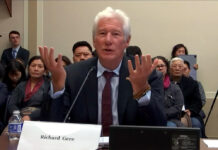
(TibetanReview.net, Sep18’19) – While complimenting the nation for having made significant progress in the reform of its national park system and the construction of the pilot national parks since 2017, a professor in Mainland China has made it clear that the system should allow local residents to participate as ecological managers rather than relocating them and pretty much leaving them to their fate, Noted Dharamsala-based Tibetan Centre for Human Rights and Democracy Sep 17.
“Under the premise of reasonable and efficient planning, let the local residents live in the park so that the construction of national parks can be promoted and the living standards of the local residents can be improved steadily,” Professor Min Qingwen, deputy director of the Center for Natural and Cultural Heritage (CNACH) of the Institute of Geographic Sciences and Natural Resources Research (IGSNRR), Chinese Academy of Sciences, was quoted as saying.
He has pointed out: “The internationally advanced thinking on environmental protection and China’s national conditions determine that humans and nature cannot be separated and management of humans should become part of ecosystem management.”
On the other hand, he has said, “The overemphasis on the relocation of local residents is not only difficult to implement in practice, but also not conducive to ecological protection. The development of national parks should allow local residents to participate as ecological managers.”
The report cited Professor Min as saying in a report published on the website of the Chinese People’s Political Consultative Conference (CPPCC) early last month that China’s national park system, introduced as part of its environmental protection policy, ignored the interests of the local residents and the important role their culture and traditional mode of production play in ecological protection.
He has said the issue of the movement and residence of local residents was a crucial point that needed attention in the overall scheme.
He has noted that China had a huge population of farmers and herders in its pilot national parks and that in order to solve the problem of ecological protection, the country must also solve the problems of livelihood and production of these residents.
He has cited findings from his field studies and research to show that in the process of developing national parks, the park administrators had focused only on the site of the protected area and ignored protection of the inhabitants as the goal.
“Recently when there were severe snowstorms and heavy snowfall in the Sanjiangyuan area making it difficult for wild animals to forage for food and water, local residents such as lay people and the monks came forward and spontaneously organised the transportation of fodder for the starving wild animals. If such an emergency or unexpected situation occurs, a handful of administrators cannot be depended upon to handle the situation,” he has pointed out.
The Sanjiangyuan (Chinese for ‘Source of Three Rivers’) area covers large parts of the mostly Tibetan prefectures of Kyegudo (Chinese: Yushu), Golok (Guoluo), Tsolho (Hainan), and Malho (Huangnan) and Tsonub (Haixi) in Qinghai Province. Over 90 percent of the area’s population is stated to be Tibetan farmers and nomads.
Professor Min has pointed out that the cultural traditions of the local farming and animal husbandry production methods, developed and honed over generations, play an important role in ecological protection. He has said the local inhabitants had developed an ecological culture centered on protecting the nature and had long followed the traditional way of balancing agriculture and grassland use with ecological protection. “Their mode of production has not caused ecological damage, and (had, in fact,) facilitated the improvement of ecosystem functions and the balanced coordination between humans and nature.”





